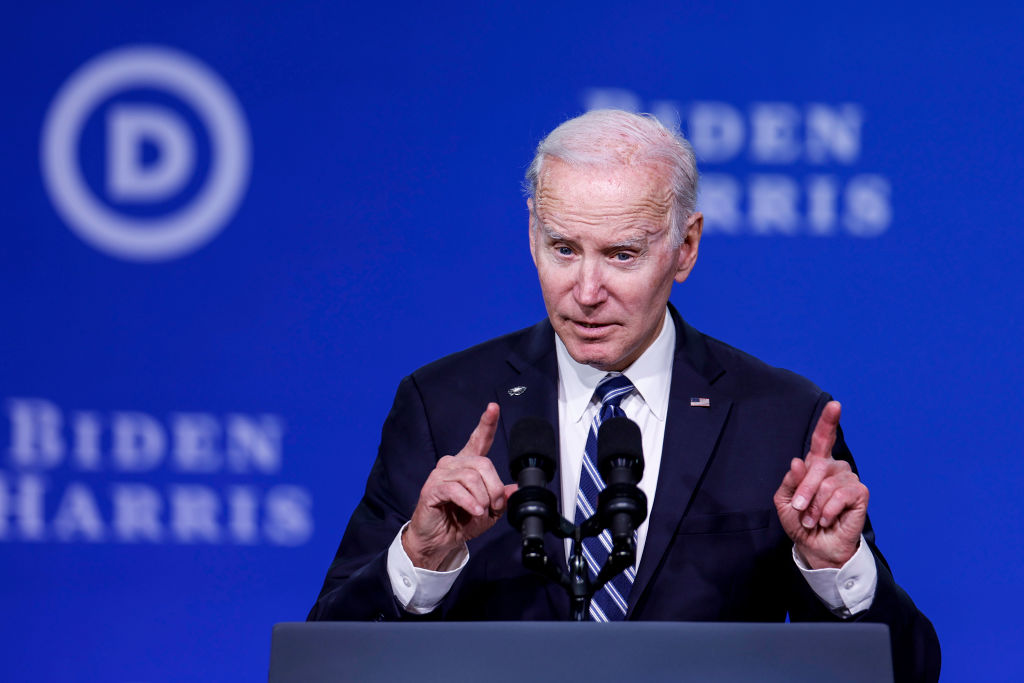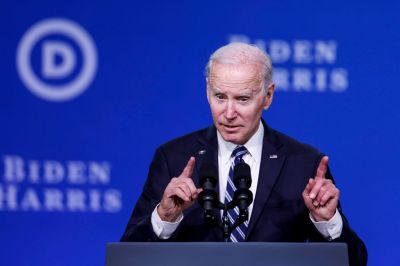President Biden will try to add some oomph to his reelection campaign this week with his State of the Union address, and he sure could use the boost.
According to NBC News’ pollsters, fewer than a quarter of adults think the country is heading in the right direction, and just 28 percent say Biden has the “necessary mental and physical health to be president.” In the most recent WashingtonPost/ABC News poll, only 31 percent of Democrats said their party should nominate Biden again, and in a hypothetical 2024 general election matchup, Biden actually trailed Donald Trump, the George Santos of former presidents, by 3 points.
Woof.
The things that are going right for Biden, like a boffo January jobs report and a successful bid to revamp his party’s primary calendar, often seem to be overshadowed—literally so, in the case of a Chinese spy balloon that transited the continental U.S. last week. Biden is looking to Tuesday’s speech for a clear shot to make his pitch for a second term, but he’s instead facing predictable distractions, like the long hangover from the shady buckraking efforts by his troubled son, Hunter, and surprises, like the quest for classified documents kicked off by the probe into Trump’s own purloining.
If you had told Biden 11 months ago that as he prepared to give this year’s big speech inflation would be easing, unemployment would be at its lowest point since 1969, illegal crossings at the Mexico border would be plummeting, Russia would be mired in a losing effort in Ukraine, Democrats would have overperformed in midterms, and that it would take 15 ballots for Republicans to elect a speaker of the House, the president would have assumed that his outlook for reelection was good. Instead, Biden is underwater with voters in poll after poll on his handling of the economy, inflation, immigration, and even the war in Ukraine.
So why does the idea of Biden being reelected produce considerably more “angry” or “dissatisfied” respondents than does the thought of Trump winning a second term, 62 percent compared to 56 percent?
First, let’s go back to that scary number for Biden from the WaPo/ABC News poll: 58 percent of Democrats want a different nominee, while just 31 percent want the commander in chief again. That’s pretty bad. But it looks even worse when you compare it to Trump, who has the backing of 44 percent of the GOP, with 49 percent opposed. Democrats may be tempted to say that this is just because the Republicans are a snake cult. Republicans will want to say that it’s because Biden is already adjudged to be a failed president and nearly anyone, including the badly damaged Trump, could beat him. But both parties should dig deeper.
Biden’s job approval, 45 percent in the latest Fox News poll, is a little better than the percentage of Americans who approve of the job Democrats in Congress are doing, 42 percent. Even the same WaPo/ABC News poll that found Biden disdained by his own party and trailing Trump with the general electorate finds the current president steadily improving in his ratings from voters. There’s some evidence in these numbers that Biden is outperforming his party generally, which would be good news for him, since voters have been increasingly down on the blue team of late.
This helps us see why, 21 months ahead of the election, the idea of a Biden second term produced more anger and disappointment than a Trump restoration. Republicans are starting a process that might yield another Trump nomination but will include lots of choices of many different kinds. Democrats, on the other hand, are facing what looks like an increasingly certain renomination for an incumbent their activist core voters have never been wild about.
Four years ago when roles were reversed, many Republicans were sour about Trump’s renomination even as he took far more brutal steps to quell dissent than Biden’s calendar changes. So Republicans should be careful not to underestimate the power of incumbency, especially in our era of weak parties and strong partisanship. In 2020, like 2016, lots of Republicans who didn’t like Trump voted for him anyway. In 2024, the same would be true of Biden. Complaints voiced in a vacuum about a hypothetical election almost two years away tend to shrivel up in the face of a real contest. Biden’s biggest problem is with his own party, and there is nothing better for party unity than fear of the other side, especially Mr. MAGA.
But Democrats should remember that persuadable voters will be very receptive to a normal kind of Republican nominee, maybe even a very conservative one. Swing state Georgia benched Herschel Walker, it is true, but Georgians also picked Gov. Brian Kemp by almost 9 points over progressive doyenne Stacey Abrams. Heck, Arizona almost elected Kari Lake governor! While Democrats are obviously unhappy with Biden as their standard bearer, they had better remember that much of what they dislike in him—particularly his moves toward moderation—are exactly what swing voters are looking for.
No incumbent president has faced a significant primary challenge in more than 30 years, all the way back to “Pitchfork Pat” Buchanan and his 1992 scuffle with George H.W. Bush. Fat and sassy after three consecutive landslide presidential wins and standing atop massive foreign policy and economic successes, the GOP was not in a mood for quietly accepting the status quo. Unconcerned about the possibility of a Democratic surge, Republicans indulged themselves in a bitter primary fight. It was a mistake, opening the way for Ross Perot and Bill Clinton to topple Bush and usher in a new era in politics.
There will be many audiences for Biden’s speech, but not the least of these will be in the room with him: Democratic leaders and tastemakers who might be open to a primary challenger or, in the case of Sen. Elizabeth Warren and some others, potential challengers themselves.
A weak incumbent invites challenges, and potent challengers have often spelled doom for incumbents who survive them: Bush, Jimmy Carter, Gerald Ford, and Lyndon Johnson were all done in, to varying degrees, by a robust intraparty challenge. It’s the doom loop for incumbent presidents. That’s why it matters far less what Republicans think about Biden’s speech than how Democrats take it.






Please note that we at The Dispatch hold ourselves, our work, and our commenters to a higher standard than other places on the internet. We welcome comments that foster genuine debate or discussion—including comments critical of us or our work—but responses that include ad hominem attacks on fellow Dispatch members or are intended to stoke fear and anger may be moderated.
With your membership, you only have the ability to comment on The Morning Dispatch articles. Consider upgrading to join the conversation everywhere.